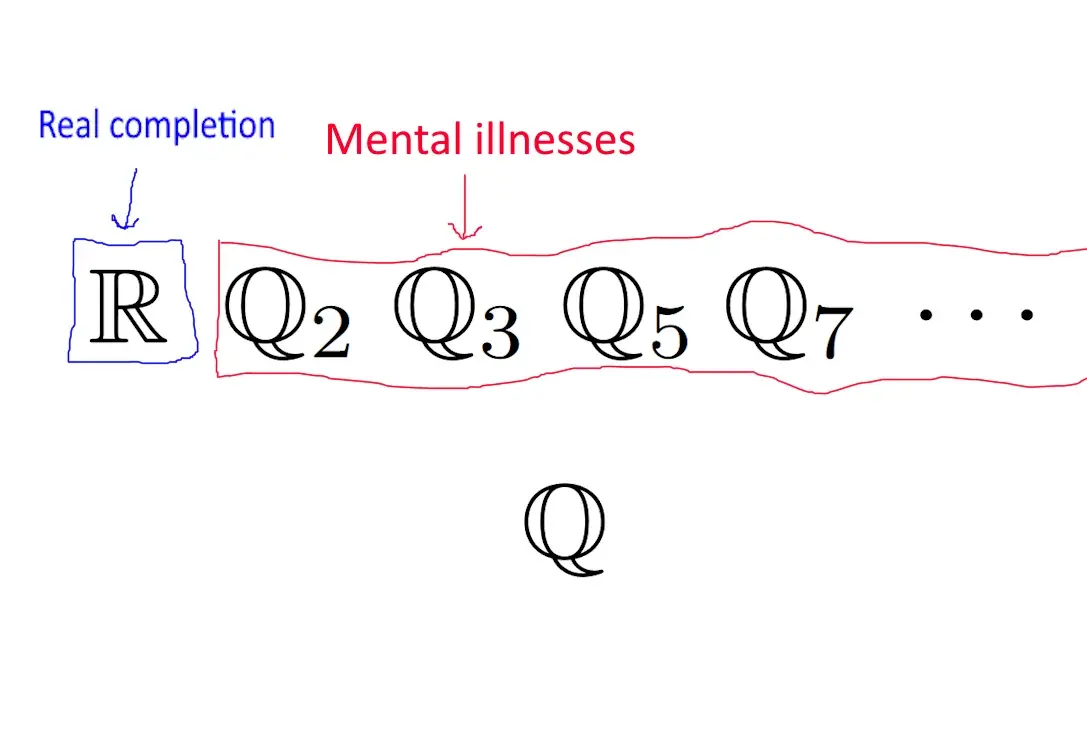Fred.
(∀x:Number(x)=T)(Name(x)=“Fred”)
I name every number Fred.
I cast set theory?
I was thinking the same thing.
Thanks.
Oh you like math? Name all the sets of sets that don’t include themselves.
Russell is that you? Please stop breaking my formal systems
Here’s a thousand page proof defining all the logical underpinning required to prove that 1 + 1 = 2.
Which negative infinity or positive infinity includes zero?
It’s certainly between them somewhere
Brackets and a comma like that indicate a range, not just a list of 2 values
But those are parentheses, are they not? I was taught intervals using square brackets and semicolon. While parentheses are used for coordinates and tuples. The square brackets indicates inclusion of the boundary number.
Ie. the statement "2
Update: apparently either lemmy or my app (boost) wasn’t that excited for my less than signs, and just skipped the rest of the comment. And here I had spent time copying both “less than or equal to” and infinity signs, since my keyboard doesn’t seem to have them… For the time being pls disregard the comment above, while I figure out how to write math on lemmy.
It’s likely just you were taught a different notation. Personally I was taught (x, y) can mean both coordinates x and y or a range from x-y (non inclusive), just depends on context which it is. Brackets like [x,y] I was taught are for inclusive ranges (i.e., x and y are included in the range)
So, what I was trying to do was use less than signs… Now I’ll just write it out instead.
The nomenclature I was taught for intervals used square brackets. But both inclusive and exclusive. If the bracket opens toward the number it’s inclusive, if the bracket opens away from the number it’s excluded.
The example I tried to use was as follows, 2 less than x and x less than or equal to 5, would be written as x = ]2;5]. While 2 less than x, and x less than 5 would be x = ]2;5[, and 2 less than or equal to x, and x less than or equal to 5, would be x = [2;5]
But it is just nomenclature, but as any other kindergartener I always thought it was universal. Imagine my surprise when I discovered that some people uses a period for decimals and not a comma. And that English speakers uses the words millions, billions, and trillions but skips milliards, billiards, and trilliards. Meaning that translating between English and Daniah, you’d need to be keenly aware of the differences - otherwise you’d might try convincing a Dane that there are 1000x more people on earth.
Parentheses (also just called brackets here in North America, where the English language comes to die) are used to show that the listed values are not included in the range. They’re always used for infinity since infinity isn’t a real number.
So 0 to infinity would be [0, ∞). I think the semicolon vs comma is a regional style thing.
There is actually zero as well as negative zero for reasons beyond my comprehension
That was the root of what I was getting at, thanks lol.
You also have to remember to put the +C at the end
i
m
g
a
y
Didn’t it 0,1,2,3,4,5,6,7,8,9?
i
e
That’s just all the Arabic numerals
Depends on the bit limit
Where’s my imaginary love?
Last time I saw this kind of challenge it was on reddit and I just replied with ℝ, but people brought up that this leaves out complex numbers. I’ll now contend, however, that any number not included in that isn’t real.

This image goes so hard
I prefer $
Just like birds, complex numbers aren’t real!
Screw you sqrt(-1), you aren’t even a real number, you poser!
You could use ℂ
That leaves out quaternions
Quaternions hello?
deleted by creator
What about quaternions and octonions and …
x
Complex numbers? That sounds imaginary.
0,1,2,3,4,5,6,7,8,9
deleted by creator
[0-9]*\.?[0-9]*edit: ok no empty strings
[0-9]+\.?[0-9]*yeah but by Cantor’s diagonal argument, you still wouldn’t be listing all the real numbers
What about imaginary numbers?
[0-9]+\.?[0-9]*[ij]?I’m not making one for mixed numbers
well sure, if you want to be fancy. i was speaking in layman terms for the rest of the world.
regex for the win.
deleted by creator
I don’t quite understand yours, why does it need parentheses? And requires the decimal point?
how about
[0-9]+\.?[0-9]*deleted by creator
Your regex matches (for example) ‘5.’ as a number
Yeah that’s on purpose. That’s often used in sciences to mark significant digits.
The thing I’m confused by in yours is you’re escaping the parenthesis, so there need to be literal parenthesis in the matching number, or that’s what it showed in the regex checker.
deleted by creator
That regex implies “” is a number
If I had a nickel for every time that happened I’d have “” nickels.
Where is i? Is it safe? Is it alright?
i goes to another school. You wouldn’t know her.
deleted by creator
Please stop talking about your imaginary girlfriend, it’s embarrassing honestly.
It seems in your equations, you conjugated it.
*
Pi
U
Ω
UΩU
UωU


















